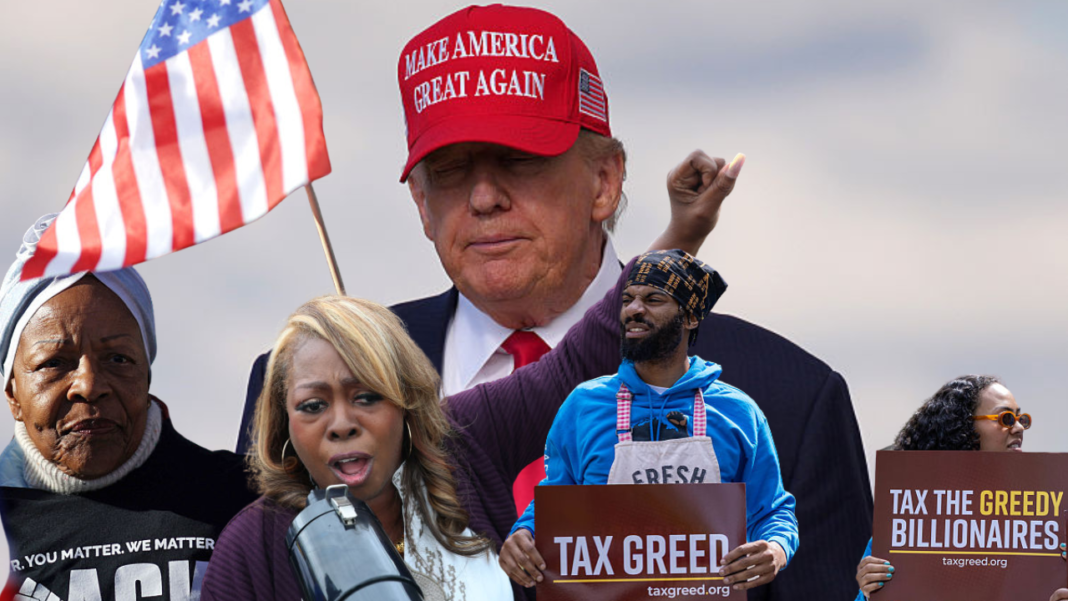The Economic Discontent in America: Insights Leading Up to the Elections
As the nation gears up for the upcoming elections, it’s clear that economic discontent is at the forefront of American voters’ minds. A recent poll from NBC News reveals a stark rejection of President Trump’s economic management. In a climate where rising prices are pinching the wallets of families across the spectrum, many Americans, especially those from marginalized backgrounds like Black households, are expressing frustration and concern.
Public Sentiment on Trump’s Economic Policy
The NBC News poll indicates that a significant majority of Americans feel disappointed in Trump’s handling of the economy. A striking 63% believe he fell short of expectations, with many citing ineffective efforts to support the middle class and manage inflation. This discontent paints a complex picture of an economy that, while often heralded by politicians, fails to resonate positively with the everyday American.
The Hardships Faced by Black Americans
For Black Americans, the economic stakes are even higher. The Black unemployment rate has surged to its highest level since the pandemic, exacerbating existing hardships. Analysis by the Center for American Progress argues that Trump’s policies, particularly his MAGA agenda, have critically undermined the Black middle class. The so-called “One, Big, Beautiful Bill Act” is perceived as favoring the wealthy and corporations at the expense of working-class families, compounding the struggles faced by Black households.
Mobilizing Voter Engagement
In light of these economic concerns, advocates like LaTosha Brown, co-founder of Black Voters Matter, emphasize the urgent need for increased voter turnout. Brown highlights the heightened stakes in the current climate, urging Black voters to participate in the polls as a means of addressing the economic crisis affecting their communities. “The stakes are much higher than they were last year,” she asserts, underlining the call to action amidst worsening economic conditions.
The Broader Economic Landscape
Several pressing economic issues loom large as well. Projections suggest that healthcare premiums are set to skyrocket in 2026 due to cuts in Medicaid, Medicare, and Obamacare. Rent prices continue to outpace inflation, leading to mounting pressure on households already struggling to meet basic living costs. Energy bills have surged, and many Black businesses are grappling with the uncertainty created by fluctuating tariffs. This multifaceted economic squeeze is prompting calls for change.
Political Ramifications and Democratic Momentum
Democrats are aiming to capitalize on the growing economic discontent, labeling it a defining issue in the current electoral landscape. Political director Markus Batchelor of People For the American Way notes the growing sentiment against corruption and rising costs as a rallying point for Democratic candidates. As millions of Americans feel the consequences of government inaction amidst the shutdown, issues surrounding the economy become increasingly critical in political discourse.
The Role of Black Women in Economic Discourse
LaTosha Brown draws attention to a concerning trend: Black women are experiencing unemployment rates double that of the national average. This decline serves as an early indicator of broader economic troubles. Brown emphasizes the need for vigilance and awareness in recognizing the nuances of economic hardship, particularly among marginalized groups.
The Rise of New Leaders
Emerging figures like Zohran Mamdani, the potential next mayor of New York City, are advocating for transformative tax policies aimed at providing relief to everyday New Yorkers. Mamdani’s proposal to increase taxes on wealthier residents reflects a growing sentiment that prioritizes the economic concerns of working-class families. Despite initial challenges in gaining traction, Mamdani’s campaign has resonated with increasing numbers of Black voters by maintaining a focus on affordability and accessibility.
Coalition Building for Change
Brown underscores the importance of coalition-building across demographic lines in addressing economic disparities. She notes that frustrations about the economy are not limited to one group; rather, they reflect a collective discontent from various sectors of society. This solidarity could pave the way for a multiracial, multi-generational coalition rallying for economic justice.
Urgency for Voter Mobilization
In the face of these challenges, Brown advocates for a shift in how voters approach elections. It’s not merely about personal affinity for candidates but about understanding the broader implications of voting. The notion that one’s vote contributes to shaping policy and outcomes is crucial in fostering a sense of responsibility among voters.
A Collective Call to Action
“Hope is vital in this moment,” asserts Brown. She stresses that collective efforts to mobilize and uplift voices is essential for effecting tangible change. With the election fast approaching, the push for voter turnout represents not just a political opportunity but a necessary movement to reclaim agency in the face of economic adversity.
Navigating the Future
As Americans grapple with the economic landscape leading up to the elections, it’s clear that the stakes are high. The intersection of race, class, and economic policy looms large, and advocacy groups are at the forefront of igniting dialogue and motivating community engagement. With voices rallying for change and voters urged to turn out in numbers, the coming elections represent a critical juncture in shaping the future trajectory of the nation’s economy.



